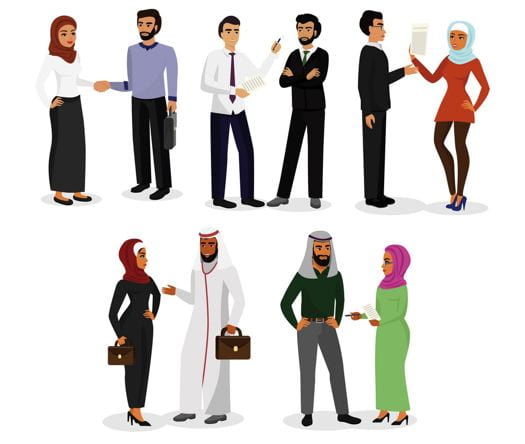For this Blog, I decided to cover what Islamic looks for in the management and qualities of a good manager. I will also discuss the differences in Western vs Islamic leadership. From an Islamic perspective, “leadership must be seen from the perspective of the worldly mission a Muslim has to fulfill. In its simplest, it is to work for the collective well-being of society through the propagation of all that is good” (Mir, 2010) There are some fundamental differences between the Western and Islamic leaderships.” Goals, traits, styles, decision-making process, methodology, nature, and participants are not similar between these two types of managerial leadership” (Ather & Sobhani, 2009. Pg. 10)
For example, the goals in western leadership usually make decisions in groups, with no reference to divine or religious efforts, but in Islam, they typically seek their religion, Allah, for problem-solving. From the methodology standpoint, in western, they set up meeting, conferences, reports, and case studies. On the contrary, in Islam, they do more consultation with the followers, especially with those with knowledge of their religion. The decision-making process in Islam also is based on Divine law and consultation with leaders who pray and worship Allah.
What I also find intriguing is the qualities Islam looks for in their managers. “Islam focuses its attention more on the individual people who manage or are managed. And less on methodologies and processes of management. This is because Islam believes that it is the individual people that guide and apply those management methodologies and practices through their motivations, enthusiasm, desire, and emotions” (Moran, 2014, Pg. 304) Some of ones that stood out to me are being optimistic, manage anger, always be truthful, admit mistakes; learn from them and avoid pride. (Moran, 2014, Pg. 305.)
In conclusion. I believe the leadership values from the Islamic perspective are all essential qualities that we should all look for in a leader. They aren’t always the main ones that We look for in western cultures such as communication or time management, but they are the skills we should look for in order to continuously improve and become a successful leader.
Sources:
Moran, R. T., Abramson, N. R., & Moran, S. V. (2014). Managing cultural differences (9th ed.). Abingdon, Oxon: Routledge.
Ather, Syed & Sobhani, Dr. Farid. (2009). Managerial Leadership: An Islamic Perspective. Doi: https://www.researchgate.net/publication/250212209_Managerial_Leadership_An_Islamic_Perspective
Mir, A. M. (2010) Leadership in Islam. J Ldrship Studies, 4: 69-72. Doi: https://doi-org.ezaccess.libraries.psu.edu/10.1002/jls.20180
Natalis. (n.d.). Retrieved from https://www.vectorstock.com/royalty-free-vector/set-of-muslim-men-and-women-vector-20665045


Hello Eva, I enjoyed your blog post about the Islamic management styles and qualities. It is interesting how much emphasis religion play into business decisions. What I found interesting in the textbook was the difference between Western and Islamic systems of economics. While the Islamic system recognizes both debt and equity financing, it does not allow for lenders to charge a high rate of interest (Moran, Abramson, & Moran, 2014). This would be a part of the quality “be just” which involves justice and fair dealing as an obligation (Moran, Abramson, & Moran, 2014, p.305).
Finally, I agree with you that there are qualities in the Islamic perspective that we should all look for in a good manager. I believe that is what is so important in having a global perspective is that we can all learn from all cultures.
Sources:
Moran, R. T., Abramson, N. R., & Moran, S. V. (2014). Managing cultural differences (9th ed.). Abingdon, Oxon: Routledge.
Well done. I agree in your assessment that there is something to be learned from the Muslim way of leading. Prior to leaving my last job we had spent roughly two years changing parts of our culture. The driving force behind that had a lot to do with the “millennial” generation. This generation was the largest since the baby boomers and with that strength in numbers comes more power to change the way things are done. Millennials also happened to be the first generation to be raised entirely with the internet. A shift in work, life balance. The need to discuss more than just the work performed but who was performing it. Millennials value relationships over careers, this is something they have in common with their Middle Eastern counterparts (Myers& Sadaghianki, 2010). These changes were foreign to my organization where we had primarily focused on achieving goals and in many cases at the expense of our employees. This is still something the organization struggles with today but there have been a great deal of improvements. I do not think that either way is “right” rather a combination of both of them could benefit both parties immensely.
Reference:
Myers, K., & Sadaghiani, K. (2010). Millennials in the Workplace: A Communication Perspective on Millennials’ Organizational Relationships and Performance. Journal of Business and Psychology, 25(2), 225-238. Retrieved from http://www.jstor.org.ezaccess.libraries.psu.edu/stable/40605781